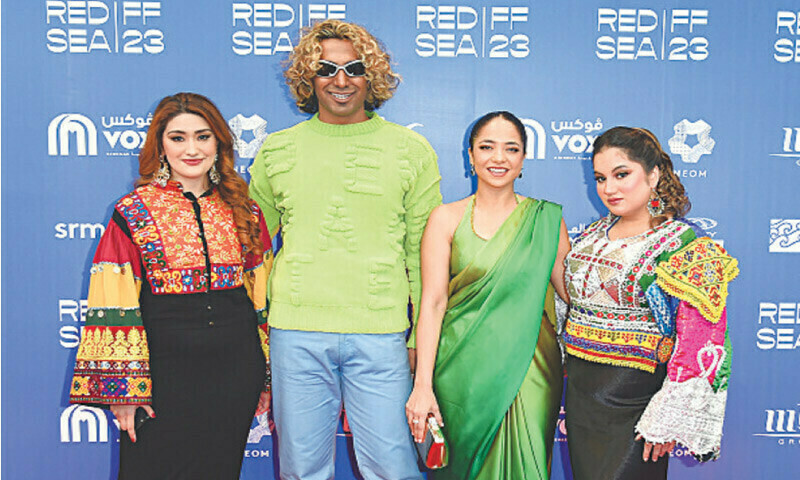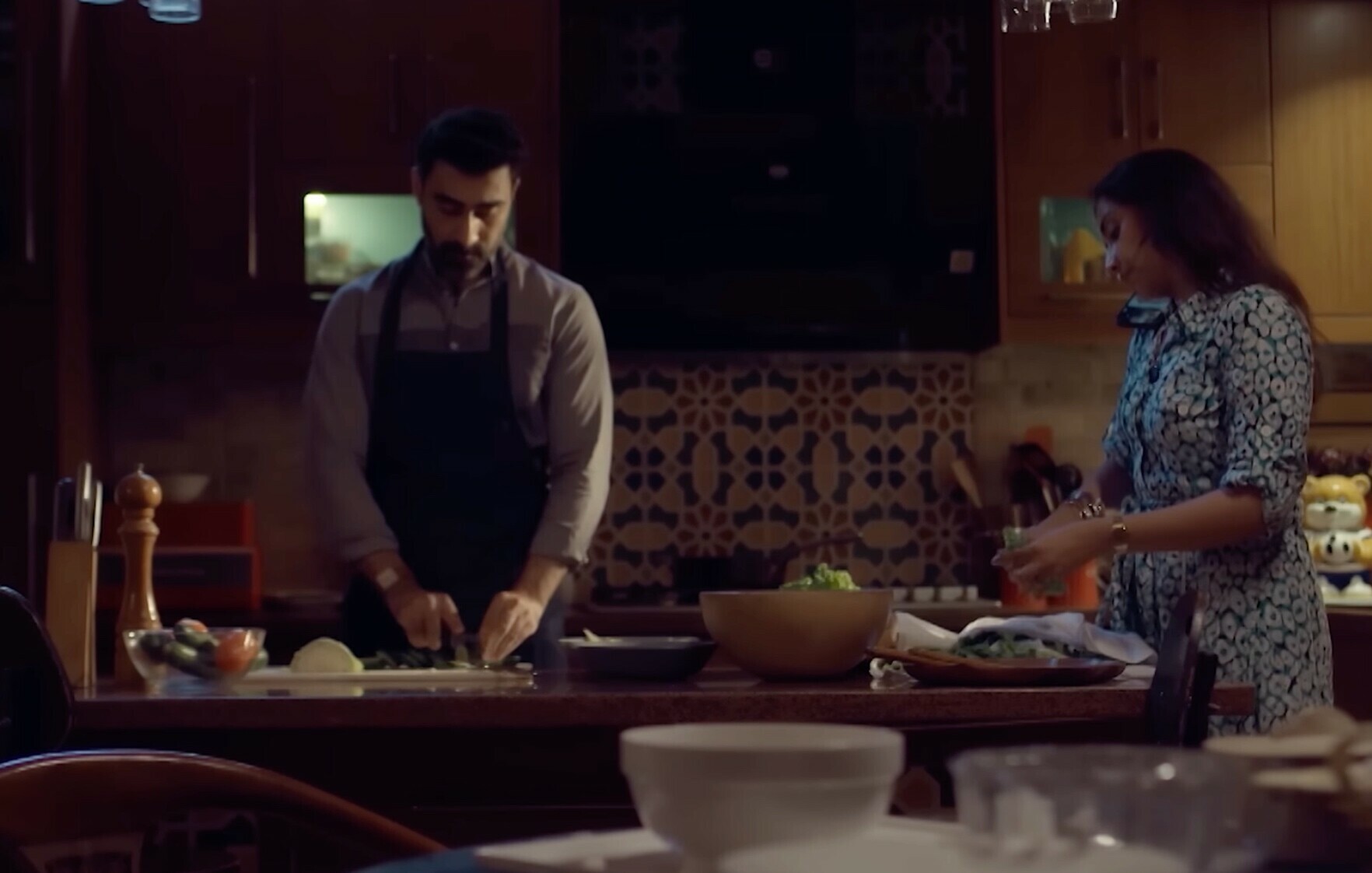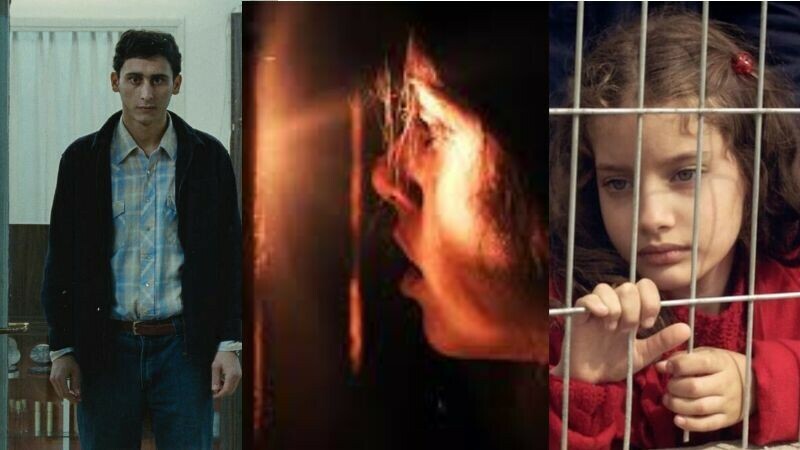Showbiz


Pakistani model Hasnain Lehri made his debut in season two of Netflix’s Dubai Bling, surprising his partner, Lebanese reality TV star Loujain ‘LJ’ Adada, with a proposal in the eighth episode.
The reality series, focusing on affluent Arab women navigating Dubai’s high society, fashion, and relationships, premiered in 2022, featuring 45-minute episodes showcasing parties, fashion, and their lifestyles.
Lehri made his debut in episode seven, arriving from Pakistan to visit his girlfriend, who is performing at a show. The two shared lunch at a restaurant, during which Adada opened up about her challenges in forming a long-term commitment. Meanwhile, Lehri openly expressed his love for his girlfriend.
In episode eight, Lehri made an emotional speech, referring to Loujain as his dream girl. The season finale culminated in Lehri’s proposal to Loujain in front of friends, leaving the audience in suspense about her response.
Some people on social media expressed surprise, while others found that he was trying too hard.
Lehri had previously shared their romantic journey on social media, posting a picture on Instagram with a caption that expressed his disbelief in fairytales until he met his princess, symbolised by the initials H and L next to an infinity symbol.
In the comment section, LJ responded and said, “My heart! H fairytales do come true.”
Following the passing of her Saudi millionaire husband Walid Ahmed Juffali, Loujai, transitioned to a career as a television host and model. After marrying Juffali at 21, who was 57 at the time, she moved to Dubai after his demise. The couple had two daughters from their union.

The 10-day glitz of the Red Sea International Film Festival (RSIFF) concluded in Jeddah on Saturday, with the last screened film touching upon the most pressing issue faced by humanity — climate change.
The film Evil Does Not Exist by Ryusuke Hamaguchi — an Academy Award-nominated director from Japan — covers the topic of local communities’ role in mitigating the impact.
It is set in a small mountainous village hours away from Tokyo, where a company plans to set up a glamping site.
The locals are concerned that the exotic retreat would pollute the streams, which are their only water sources and lead to waste disposal issues.
The film carries many parallels to the so-called development projects carried out in Pakistan and packaged as mutually beneficial for the developers and local communities.
The movie showed locals refusing to budge even when told about the prospective monetary benefits they’d get from the glamping site.
The satisfying and fulfilling simple life of the villagers has been excellently contrasted with the two dissatisfied company representatives who hate their jobs and are more concerned with money than spiritual satisfaction.
The film, with minimum dialogues and unusually splendid camera work, shows the scenic beauty of the mountainous area.
The movie’s underlying message is the importance of the action local communities should take to stop the capitalist forces from destroying the environment.
Mr Hamaguchi, who started the project as a short film, later decided to turn it into a feature film.
Pakistani short films
Two Pakistani short films were also screened at the festival. One of the films, Solatia, was about a woman being displaced after military operations in Pakistan.
While the movie didn’t name any of the places or specific operations, it depicted the issues faced by people in makeshift camps. It also showed the embezzlement of funds collected in the name of displaced persons.
The director, Hira Yousafzai, who was present at the screening, told Dawn that as a Pakhtun woman, the movie’s topic and theme were really important to her.
“[When] the story was being developed, a huge population of the country was displaced. They had no homes and had to relocate to temporary shelters, which were often tents,” said Ms Yousafzai.
She termed Solatia’s world premiere at the festival “an incredible experience” as the film was shown alongside other outstanding works from around the world. “The audience’s response was genuinely heartening.”
About the title of the film, she said Solatia was derived from the Latin word solatium, a term coined during wars to describe collateral damage — people’s homes and also their family members.
“The families were later offered a “solatium” which was a sum of money seen as an apology, and the acceptance of this sum was seen as forgiveness,” Ms Yousafzai said as she credited Jonathan Sonnenberg — who wrote the script — for coming up with the title.
Talking about her journey to the festival, the director said she had submitted a short film, which she wrote and directed, to the Muslim International Film Festival (MIFF).
It won the best short film award, and MIFF CEO Hirra Farooqi offered to collaborate. Mr Sonnenberg began working on the script, and Ms Yousafzai took the role of the director and co-writer.
The second short film was Eid Mubarak, which depicts an issue ignored by most Pakistanis and, in fact, the whole Muslim world.
The short film, directed by Mahnoor Euceph, explores the theme of trauma experienced by children when animals are sacrificed on Eidul Azha.
The main character in the movie is Iman, who, like other children, goes to buy a goat for Eid and names her Barfi.
She takes care of the goat as her pet, showering her with love and affection. On the morning of Eid, she couldn’t bear the sight of her dear goat being slaughtered.
However, her efforts to save the goat proved futile, and she witnessed her pet being slaughtered in front of her and then forced by her mother to eat its meat.

نیلم منیر نے حال ہی میں انسٹاگرام پر مداحوں کے سوالات کے جوابات دیے، جہاں انہوں نے حیران کن طور پر زندگی، موت، گناہوں، آخرت اور گناہوں کی معافی کی باتیں کرکے سب کو تشویش میں مبتلا کردیا۔
نیلم منیر جیسی بولڈ اداکارہ کی جانب سے موت، آخرت اور گناہوں کی معافی کی باتیں کہنے پر مداحوں میں تشویش پھیل گئی کہ شاید اداکارہ بیمار ہیں یا ان کی زندگی میں کچھ مشکلات آگئی ہیں۔
اداکارہ نے مداحوں کے سوالات کے جوابات دیتے ہوئے یہ انکشاف بھی کیا کہ انہیں بھارتی فلم انڈسٹری سے کام کی پیش کش ہوچکی ہے اور بعد ازاں انہوں نے واضح کیا کہ انہیں بولی وڈ نہیں بلکہ تامل فلموں میں کام کی پیش کش ہو چکی ہے۔
تاہم اداکارہ نے یہ واضح نہیں کیا کہ انہیں کون سی فلم میں کب کام کی پیش کش ہوئی اور انہوں نے فلم میں کام کرنے سے کیوں انکار کیا؟
ایک مداح کو جواب دیتے ہوئے نیلم منیر نے کہا کہ اگرچہ ان کے موبائل فون میں ان کی پسندیدہ بہت ساری تصاویر موجود ہیں لیکن وہ پکچر گیلری میں جانا نہیں چاہتیں۔
اداکارہ نے بتایا کہ ان کے موبائل کی پکچر گیلری میں ان کے ماموں کی بھی بہت تصاویر موجود ہیں اور تصاویر کو اسکرول کرنے کے دوران انہیں اپنے ماموں کی تصاویر بھی نظر آئیں گی، جنہیں وہ دیکھ نہیں پائیں گی۔
نیلم منیر نے انکشاف کیا کہ ان کے ماموں کا حال ہی میں انتقال ہوا ہے اور وہ ان کے والد کے برابر تھے، وہ ان کے بہت قریب تھیں، اس لیے وہ ان کی تصاویر نہیں دیکھ سکیں گی۔
ایک مداح نے ان سے سوال کیا کہ وہ اپنی زندگی میں کون سا ایک مقصد حاصل کرنا چاہتی ہیں؟ جس پر اداکارہ نے مختصر جواب دیتے ہوئے آخرت کا لفظ لکھا۔
ایک مداح نے ان سے پوچھا کہ ان کا خواب کیا ہے، جس پر اداکارہ نے زندگی، موت، گناہوں، معافی اور آخرت کی باتیں لکھ کر سب کو افسردہ کردیا۔
اداکارہ نے لکھا کہ موت برحق ہے لیکن ان کا خواب اور خواہش ہے کہ ان کی نماز جنازہ اچھی ہو اور خدا کے حکم سے انہیں جنت میں اعلیٰ مقام حاصل ہو۔
نیلم منیر نے مزید لکھا کہ ان کی کوئی دنیاوی خواہش باقی نہیں ہے، انہیں اپنی آخرت کی تیاری کرنی ہے اور اچھی تیاری کرنا ان کا خواب ہے۔
اداکارہ نے لکھا کہ خدا انہیں گناہوں کی معافی دیں اور انہیں ان افراد میں شامل کریں جو خدا کو پسند ہوتے ہیں اور ان پر اپنا رحم فرمائیں۔
اداکارہ کی جانب سے موت، زندگی، مغفرت اور آخرت کی باتیں کرنے پر ان کے سیکڑوں مداح پریشان ہوگئے اور انہوں نے تشویش کا اظہار کیا کہ اداکارہ کے ساتھ کوئی مسئلہ ہے، ساتھ ہی بہت سارے افراد نے ان کی جانب سے مغفرت اور آخرت کی باتیں کہنے پر خوشی کا اظہار بھی کیا۔

Recently aired on Green Entertainment, Gumn is a limited series with 13 episodes. Directed by Sarmad Khoosat and starring Tooba Siddiqui and Feroze Qadri, Gumn is a drama with a sufficient dose of suspense. Siddiqui, who also authored the drama along with Hamza Kazi, plays the lead as top criminal lawyer Maya Malik who remains rattled by her father’s murder and is doing everything in her power to get to the bottom of things.
The drama is a story of how Maya’s life intersects with Rayyan’s (played by Qadri) and how they try to resolve their respective troubles, sometimes with help from each other.
Along with the refreshing experimentation of the series with the genre of mystery, there are several interesting elements and portrayals in this drama that one wishes were shown more often.
A thriller with a non-linear story arc
Gumn is a thriller with a non-linear story arc. The drama is adequately stacked with flashbacks to support the growth of the narrative while maintaining a sense of mystery as needed by the story. This isn’t exactly a narrative form that we see local dramas experiment with often enough, and that’s a pity, given that it is a very intelligent and useful device. Our audiences are also mature enough to work with non-linear storytelling and it would be welcome if we saw more such experimentation.
Shattering the bara bhai stereotype
A very welcome element in the story is the character of Rayyan, who is shown as an elder brother who loves his sister without conditions. He is not self-centred, nor a tantrumzilla, and he cares about his sister despite the limits set upon him by the patriarchal society he lives in. Sadly, a man being a decent human being and doing the bare minimum can be a big deal in some milieus and it’s refreshing to see Gumn not playing to the so-called ghairatmand bhai stereotype nor promoting that stereotype.
There is life after divorce
If you didn’t find out until well into the drama, you wouldn’t know that Maya is a divorcee. The drama makes divorce “not a taboo” but a practical way to address a marriage that isn’t working. The fact that Maya’s life is not all about her divorce and that those around her are not constantly bringing it up to her or to others in her absence is a welcome break from what we’re used to seeing on local television.
You can be male and interested in kitchen stuff. Heavens won’t fall!
A welcome part of the story is the character of Maya’s brother-in-law, played by Fawad Jalal, who is quite often seen working in the Malik sisters’ kitchen. The BIL is also passionate about food and is ultimately up to opening a restaurant as well. For a viewer who is used to seeing women toiling away in the kitchen without a male family member even offering to help because ‘log kya kahain ge’, the sight of a man working in a kitchen without anyone worrying about ‘how that looks’ is a novel approach.
If you see someone contemplating suicide, don’t treat them like a criminal, help them instead
There is a fleeting but key reference to attempted suicide in the story (not sharing more) and thankfully, instead of addressing it as a crime as the law was until recently wont to do, the characters involved try to address the issue differently, through helping the one who needed that help and without judgment. This is a message that needs more emphasis in a society where addressing issues related to mental health largely remain taboo.
These are just a few bits that stand out when I think about Gumn. And while this drama may not have many more surprise takes up its sleeve, what it has offered has already been quite a treat.

ith the Gaza invasion dominating headlines around the world and Israel carpet bombing the Gaza strip, killing scores of civilians, we have complied a list of films that highlight the plight of Palestinians so that people remember the human stories behind the statistics.
His powerful statement rings true as Palestinians have been suffering under the apartheid rule of Israel for far too long. Palestinian people have tried various ways to raise their voices and tell the world about Israel’s atrocities, which have been ongoing since the Nakba in 1948. One of the most successful methods has been telling real stories through films, dramas, and documentaries.
Here are 10 films that depict how the people of Palestine have suffered for the past 75 years.
Farha (2021)
The film depicts the true story of a Palestinian girl who survived the Nakba of 1948, when thousands of Palestinians were expelled from their homeland. The hopeful young girl who wanted to study in the city watched silently from the pantry of her house while Israeli forces ethnically cleansed her neighbours and other fellow countrymen slaughtered by them.
The movie, directed by Hassiba Freiha and Kenton Oxley, is available on Netflix.
Tale of the Three Jewels (1995)
Set in contemporary Gaza, the movie is the story of a Palestinian boy, Yusef, who becomes entranced with a beautiful Gypsy girl. The children explore nature, mysticism, and their future while learning to live amid the surrounding brutality. To escape, Yusef sets off on a journey to the North American dreamworld with his blind neighbour.
Directed by Michel Khleifi, the movie is available to watch online on various sites.
Children of Shatalia (1998)
Farah, age 11, and Issa, age 12, are two streetwise children living in Beirut’s Palestinian Shatila refugee camp, located in the city’s “belt of misery.” The centre is home to 15,000 Palestinians and Lebanese who share a common experience of displacement, unemployment, and poverty. The two children are given video cameras; they use their imaginations and creativity to come to terms with the realities of growing up in a refugee camp that has survived massacre, siege, and starvation.
Directed by Mai Masri, the movie is available on Netflix.
Omar (2013)
Omar is a young Palestinian man living in Israeli-occupied West Bank where he must navigate a steep separation wall and checkpoints to visit his friends. Omar sees his horizons diminish after he carries out a sniper attack with his two childhood buddies. He’s captured, imprisoned, tortured, and coerced into becoming an informer for the Israelis but finds he’s not the only traitor.
Directed by Hany Abu-Assad, the second film from the Palestinian territories to be nominated for an Academy Award is available on Netflix.
Pomegranates and Myrrh (2009)
The film tells the story of a Palestinian woman who uses Dabke (a traditional folk dance) to cope with the loss of her husband, who is taken away by Israeli authorities. The story talks about the political climate of Palestine and the internal and external sufferings of Palestinians.
Directed by Najwa Najjar, the movie is available on Netflix.
Eyes of a Thief (2014)
The film’s central plot-line is a father’s search for his daughter. As he searches, he not only has to fight against the lack of freedom under occupation but also against social boundaries. Having served a 10-year prison sentence for an attack on Israeli border soldiers, Tarek sets out to find his daughter Malak. When he eventually finds her in Nablus, however, he discovers that she has been adopted. He can’t reveal himself publicly as her father, so he takes a job nearby working as an engineer for the official in charge of water at the Palestinian National Authority to be able to approach her in secret.
Directed by Najwa Najjar, the film is available on Netflix.
3000 Nights (2015)
The film illustrates the plight of political prisoners in Israel. Set in 1980, Nablus, 3000 Nights follows a newly-married school teacher, Layal, whose crime is giving a ride to a teenage boy who is accused of executing a lethal attack on a military checkpoint. Layal is sentenced to eight years in prison, where she spends her pregnancy and gives birth to a boy.
Directed by Mai Masri, the film is available on Netflix.
The Time That Remains (2009)
This semi-autobiographical film tells the story of a father who fought in the 1948 war and chose to stay back when Israelis took over. It depicts the life of Palestinians living as a minority on their own land. The film is divided into four parts.
Directed by Elia Suleiman, The Time That Remains is available for streaming on Apple TV.
The Present (2020)
A father-daughter duo living along the Palestine border sets out to buy a fridge. The pair has to cross the checkpoint, segregated road, and armed soldiers, which involves a stringent checking process to cross the border. The movie depicts the life of Palestinians who can’t do basic daily routine things without facing harassment by IDF soldiers.
Co-written and directed by Farah Nabulsi, the BAFTA Award-winning film is available on Netflix.
When I Saw You (2012)
This story focuses on the heartache of a young boy, Tarek, who wants his father and his state back. He is displaced in a grim camp, with no one to turn to, and proceeds on a journey to turn his life around.
Directed by Annemarie Jacir, the movie is available on Netflix.
If you are interested in the historical context of the Israel-Palestine conflict, take a look at this list compiled by Al-Jazeera.
As Israeli forces bomb Gaza relentlessly to ‘punish’ Hamas, killing thousands of innocent Palestinians, it is important to remember their stories.

Mere Ban Jao, a drama based on multiple real-life cases, looks at how revenge porn affects women. The protagonist, Azmia (played by Kinza Hashmi), is engaged to her cousin Fardeen (played by Azfar Rehman). Fardeen loves Azmia but, as we come to see, has severe anger issues and abusive, narcissistic tendencies.
Before the wedding, Fardeen emotionally blackmails Azmia into performing sexual acts on a video call, which he secretly records. Initially, Azmia is terrified and reluctant but Fardeen repeatedly reassures her that it’s not a big deal since they are pretty much already husband and wife and, anyway, she should be willing to do this one ‘small thing’ for his happiness.
Later, Azmia and Fardeen’s relationship ends over allegations that Azmia is involved with her tailor, played by Zahid Ahmed. It is a drama, after all. By this point, Azmia can clearly see Fardeen for the deeply problematic, toxic person that he is and refuses to give him any more chances. In an act of revenge, Fardeen posts Azmia’s videos (with his face blurred) online for the world to see.
According to Hashmi, who plays Azmia, the way private pictures and videos are used for blackmail and exploitation is a relevant topic in today’s digital age. The actor, who spoke to Images earlier this summer, said she prepared for Azmia’s character by reading about revenge porn cases online. She said she personally knows women who have trusted the wrong person and fallen victim to revenge porn and that it’s becoming increasingly important to be cautious about trusting others with sensitive information.
“Dramas showcase the realities of our society and act as a mirror that reflects the social implications and challenges faced by individuals. It’s crucial to bring forth unconventional and thought-provoking scripts that go beyond the traditional saas-bahu dramas and love stories and address pressing social issues that affect our communities,” Hashmi told Images.
Even though she was eager to highlight the issue of revenge porn, she was nervous about filming the scenes in which Fardeen is forcing Azmia to do intimate acts over video.
“I was hesitant to do the scene but then I sat with my director [Ahmad Kamran] and planned how to subtly convey the message without it being uncomfortable. It’s understandable to feel apprehensive…as there [are] concerns about potential backlash or controversy. However, we couldn’t carry on with the story without showing this scene,” explained Hashmi.
Smartphones and social media have made it easier than ever to share photos and videos online. This has made revenge porn more common than ever. While anyone can be a victim of having their photos and videos leaked without their consent, the most common victims are women and girls between the ages of 16 and 26.
Earlier this year a BBC Panorama investigative report uncovered a subreddit where users traded non-consensual pictures of South Asian women. Before it was shut down, the unnamed subreddit had over 20,000 members and more than 15,000 images. Some images even contained the woman’s personal details.
Three women, who reached out to Images anonymously, described the devastating impact of having their intimate pictures leaked by vindictive exes. All three experienced debilitating depression and anxiety and, even years later, walk around feeling as if everyone is looking at them or talking about them.
Once a photo or video is posted online, it can be challenging to completely remove it from the internet, which means that many women feel haunted for years and years by the threat of an old intimate photo or video resurfacing.
One woman who spoke to Images described how a leaked nude video of hers ultimately cost her her job. Another, who was only 14 when nude images of her were posted to a website by an older man who had pressured her into taking them, said she still compulsively searches the internet to see if her pictures pop up on any websites. Yet another woman told Images that although five years have passed since her semi-nude selfies were leaked by a bitter ex, the first thought she has when she meets someone new is whether they have seen her semi-clothed.
For the longest time, there were no consequences for the person committing the criminal act of posting revenge porn. But, in 2016, Pakistan adopted a set of policies that criminalises distributing video or photos “in a manner that harms a person” without their consent. The crime is punishable by up to five years in prison and a Rs5 million fine.
But changes to laws don’t always equal changes in mindsets. Even though the person who shares someone’s intimate photo or video without their consent is committing a crime, it’s still victims who continue to disproportionately receive the blame.
As Mere Ban Jao depicts, victims who have their intimate photos and videos circulated on social media channels, pornography sites or even WhatsApp groups, have to live with not only the public humiliation but can also experience threats to their personal safety and mental health.
According to Hashmi, protecting yourself online is important and something we should all be vigilant about but, ultimately, the person who shares your personal content without consent is the one to blame, not you.
Azmia was naive to fall prey to Fardeen’s trap…but later she [takes] a stand for herself. I guess that’s the real crux of the story.
![]()
Hero, host, producer. Fahad Mustafa is indubitably one of Pakistan’s favourite leading men. And an interview with him is never boring.
I believe that it can also never be politically correct. Fahad, at the zenith of his stardom right now, is not one to abide by what others consider to be ‘proper’.
It’s a major part of his appeal: the witty rejoinders, the impassioned opinions, the cocky quips delivered with a boyish smile, the caustic observations that are more or less all declared ‘off the record.’
His candid commentaries may have often made Fahad the disgruntled recipient of social media headlines, but they are also what endear him to a massive audience. They come to watch his movies and when he roams about a shiny, expansive set in Ramazan, doling out gifts, holding contests and bantering throughout, they love him for it.
He is at the zenith of his stardom right now, playing lead characters in films, raking in money from commercials and event appearances, and hosting a decade-long-running game show. He is also behind one of the top TV drama production companies. So why is he so disgruntled and caustic? Why does he say he is not enjoying anything?
He is ‘Fahad bhai’, an intrinsic part of their household every Ramazan for the past 10 years, through his show Jeeto Pakistan on ARY Digital.
In that vein, I know that an interview with Fahad will also always be widely read.
“I am completely myself when I am hosting Jeeto Pakistan,” he tells Icon.
More than he is at awards shows or at media events or during an interview? “Absolutely,” he says. “I am with my audience and they meet me with love and happiness without any ulterior motives. They are not searching for something negative about me so that they can criticise me later, they are not trying to cash in on meeting me by making a YouTube video. There are no strings attached.
“I am not really a host,” Fahad smiles. “I just go out there, not caring, being myself and perhaps that’s what has worked for Jeeto Pakistan.”
Would he be upset if, tomorrow, the show would close down?
“No, I have wanted the show to end for the past six years, but the audience response has always been so enthusiastic that it just keeps airing year after year,” he confesses. “I do enjoy hosting the show. If I have to host at any other time of the year, I literally have to be dragged out to the set. But there is a special feeling to hosting Jeeto Pakistan in Ramazan.
“There is only one day’s show in Ramazan that I don’t record live. I open my fast at home and the channel plays a pre-recorded show. When I step out of my home after iftar, I can hear my voice coming from the windows of all the homes around me. That’s very special.
“If tomorrow the show ends, I won’t miss it. But I do know that I wouldn’t want to host on any other channel.”
Channel loyalties
This leads to the inevitable question: why not the other channels?
Fahad replies, “My productions and hosting are all associated with ARY Digital, but the films that I act in are usually in partnership with other channels. I set my acting work aside for the others.”
He continues: “I did use to work with other channels, but then I stopped. Some didn’t pay me the money that they owed me and production can only continue if you get regular returns from the channel that you’re working with.
“It’s really so unfortunate that we have a handful of major channels and they can’t collaborate together for the betterment of the industry, particularly film. There have been many times that I have suggested to them that they just need to invest into different films together and, within 10 years, our TV actors will be major film heroes. We won’t be referencing Shah Rukh or Amitabh then. But no one wants to work together.”
He recalls, “I remember that there was this one time that a movie of mine was about to release and Bollywood actor Shah Rukh Khan’s movie Dilwale was also releasing around the same time. My movie was only promoted on the one channel that was its media partner. All the other talk show hosts and news channels completely ignored it, as if it didn’t even exist.
“On the other hand, the SRK movie was talked about on every small and big channel, with people reviewing it and interviewing the cast. It was free of cost promotion across the board. Why can’t we extend the same kind of support for our own films?”
He openly professed to be part of the ARY team at the recent Lux Style Awards (LSAs), a ceremony that will be airing on another channel, the Hum TV Network. Did this end up raising eyebrows?
“Why would it?” he questions me. “I would never make any below the belt jokes or insult anyone. But we were at an awards ceremony — Pakistan’s only major awards ceremony to my mind — where major representatives of all the channels were present. There is nothing wrong with everyone sitting together and laughing together.
“Why is it getting difficult for people to sit together? Humayun Saeed’s and my movies have often been released simultaneously and been nominated together. I have always been very happy for him, whenever he has won. My respect for him has never decreased.
“The way the fraternity perceives the LSAs today makes me sad. I have seen grand LSA ceremonies, where everyone used to gather together. Last year, the event took place in Lahore and very few people came. And the ones who did — even the ones who were paid to be there — decided to criticise the event afterwards. Don’t come at all if you don’t agree with the awards. Don’t talk about it later at least. Why does everyone have to have an agenda?”
Critical thinking
Also, at the LSAs, many of Fahad’s jibes were against the media present. “We haven’t done anything controversial yet. Let’s give them something to talk about,” he and co-host Saba Qamar had joked with each other.
This isn’t anything new. He has, on countless occasions, spoken about critics not being genuine in their comments, about unfair favouritism and how Instagram blogs and YouTube pages are solely focused on controversy.
It is true that some of his productions may not have gone down well with some critics but, at the same time, he has often been the recipient of effusive praise for his work. Why is he so mistrustful of the media?
“I just see everyone around me trying to create controversy and cash in on it,” he says. “I see people interviewing celebrities and, instead of focusing on their guest’s work, trying to look like stars themselves.
“Our actors don’t get any prior training. They come into this profession and learn over time. It is unfair that four people sit together and try to catch them out by asking them tricky questions, waiting for them to make a blunder so that they can be humiliated.
“Nowhere in the world is a production critiqued while it is still on air. It is only here, while the drama is still trying to attract an audience, that our critics sit and start looking for flaws.” This assertion is of course completely wrong, but I let Fahad continue.
“And they’ll point out the strangest things — like what was so and so wearing. They are actually taking their personal revenge, because that particular actor probably hadn’t given them the time of the day.”
So, should there be no critique at all then? “There should be, but it needs to be genuine and not petty,” Fahad says. “It is because of the drama industry that they are there and we are there. We all need to work together, in order to make sure that it grows.”
He adds: “And now, four, five actors working in our own industry have decided to sit on TV and criticise our work. They say that they want to teach us how to do things right. If they want to teach me, they know me, they can come and tell me. But they want to do it on TV, of course, so that they can earn money from it.
“I can guarantee that if today I call these actors, while the show itself is being filmed, and offer them a role, they will jump at it, without even reading the script.
“If actors want to improve a drama, my request to them is to just come on time. Even that would be enough.”
A patience for production
So actors don’t come on time even when a drama is helmed by a production house as prestigious as Fahad’s Big Bang Entertainment?
“No, and when they come, a lot of them are unwilling to work,” he says wryly. “Producers and directors have their work cut out for themselves, shooting in a 500 square yard house, with four or five rooms, with half the day spent trying to figure out how to dedicate one entire room to an actor who is adamantly demanding it.
“If they think a drama’s script is bad, they don’t have to sign on to it. No one’s forcing them. They can sit and wait for a script that they find better. But they want to earn also and they want to later complain about the drama as well.
“Naumaan Ijaz is a senior actor famous for saying whatever comes to his mind but, from my perspective, there could be no better performer. When he comes on set, he is intent on understanding his director’s vision, regardless of whether it is a new director or an old one. It’s why, even when he stars in a guest appearance in a drama, his role makes an impact.
“And this is why, sometimes, actors with major roles are completely forgettable. They just aren’t interested in working when they come on set!”
I can sense a lot of pent-up frustration from Fahad with his producer hat on. He continues: “Just consider: if Pakistani dramas are that bad and, tomorrow, the drama industry closes down, all these actors complaining about their work will no longer be earning.”
I observe that a drama producer must have to be very patient.
“The producer only has to be patient!” he exclaims, adding, “But I love it. I get to work with so many different people. If I am producing four different dramas and even if the actors are giving me trouble in two of them, I will really be enjoying myself in the other two.
“Like, I am working on a new drama right now starring Hamza Sohail and Iqra Aziz and both actors are so passionate about their work and just as invested as I am in their doing their best. Whether the drama is a success or not comes later, but the process of making it should be fun. There are actors who are terrible, some who are good and some who just don’t seem bad because they are lesser evils compared to others!
“It’s just that, in the past two years or so, actors’ attitudes have changed to such an extent that work can become difficult. So many of them get blinded by money or social media fame or the lies fed to them by people who flatter them. I have also met plenty of people who flatter me, but I prefer to spend my time with genuine friends who will call me out and give me their honest opinions.
“Also, actors need to let their director’s vision guide them rather than dwell over what critics and people in general are saying. During the pandemic, I produced a drama called Nand. We followed strict precautionary protocols but we didn’t stop shooting and the drama kept the channel running.
“Critics had the usual issues with the story but I didn’t care and, eventually, the drama spanned 150 episodes. And then, when I visited Canada for an event, everyone there knew the names of the characters, the dialogues, the plot twists. I don’t care what these four so-called intellectuals say about my dramas — and neither should actors!”
Fahad is on a roll. “Similarly, I was recently on a private cruise along with [director] Nadeem Baig and [actor and screenwriter] Vasay Chaudhry, and people there kept asking me about my drama Bandish. These were people who travelled the world, had access to all kinds of content, but they were watching my drama. The beauty of our dramas is that the entire family can watch it together. It’s what keeps our audience hooked.”
What about dramas that drag endlessly, relying on umpteen flashbacks and long renditions of the title track in order to extend the story by several more episodes, I ask him. “Sometimes, they drag. Sometimes, people want to listen to the title track again. You are looking at the drama far too critically, searching out flaws,” he tells me, softening the words by smiling. “The audience likes it.”
Playing favourites
So, what does he enjoy the most: acting, hosting or producing? “I love acting in films,” he promptly replies. “I think it’s also because my movies have generally done well.”
Was he expecting to win the Best Actor award at the LSAs, especially since the organisers requested him to leave the stage, where he was hosting, to sit in the audience right before the announcement?
“I really wasn’t,” he confesses. “I was there as one of the hosts of the ceremony. I didn’t even know that my drama Betiyaan, which won in the Best TV Long Serial category, was nominated. Real happiness comes from your work speaking for itself, not your controversy.”
Does he sometimes not hire certain actors because they have recently been involved in a controversy? “Yes, sometimes I don’t,” he says. “I don’t think like that, but channels have to, and they have their particular requirements when they invest so much money into a project.
“There are times when we may not work again with certain actors for a while because they have been difficult. After some time, though, we might work with them again and, maybe, by that time they may have improved.
“Times have changed so much,” he says. “Everyone’s just got so obsessed with social media that work suffers. Even if I am invited to a dinner by someone, they start making movies of me. I want to be able to smile freely, to not always be alert for the camera. Also, everyone has a YouTube channel. I was in Lahore some days ago, and I had to sit for three interviews for friends who are now YouTubing or hosting talk shows. It’s unfair.”
I recall a time when he actually used to love interviews, remembering when I first interviewed him many years ago. “Yes, I used to love it but not anymore. I don’t really enjoy anything much right now.”
I think he notices my raised eyebrow.
“But I will,” he tells me quickly. “I am getting some scripts written. Next year, I will be acting a lot, I am contemplating about acting in a drama, working in one film directed by Nabeel Qureshi and two that I plan to produce myself.”
That’s exciting news. I tell him that I hadn’t known that he was considering film production. “I would have done it a long time ago but the pandemic slowed things down,” he says.
Perhaps then, next year, when I meet Fahad Mustafa he will be enjoying himself more. Or maybe there will be new disgruntled observations, shocking commentaries and incisive home-truths.
There will also be new successes, no doubt. He may not be politically correct and he may look at the workings of the industry with a jaundiced eye these days, but Fahad Mustafa also knows what works for his audience.
That’s what makes him their hero.


